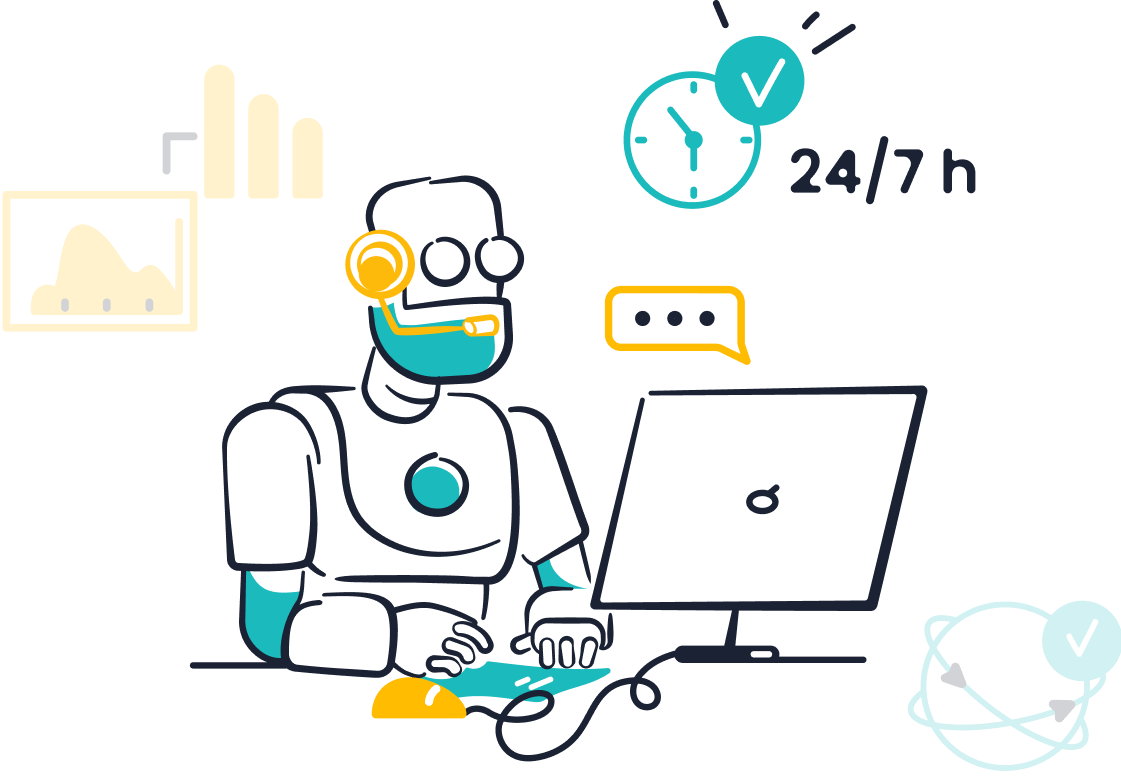Boosting Customer Experience with Automated Customer Service

Automated customer service continues to transform customer experience by meeting the rising demand for speed and efficiency. Today, customers expect instant responses, seamless omnichannel support, and personalized interactions. In fact:
- 72% of customers want immediate service.
- 80% of executives report better customer satisfaction after adopting conversational AI.
- 60% of customers choose brands based on expected service quality.
Sobot leads innovation in customer experience automation, offering solutions like Sobot AI and Sobot call center that help customers resolve issues quickly and efficiently. Companies see increased loyalty and revenue when customer support meets these new standards. Businesses should consider how customer experience automation can address what is automated customer service and help their customers feel valued.
What is Automated Customer Service

Definition and Key Features
Many businesses today ask, what is automated customer service? This approach uses technology to handle routine support tasks and answer customer questions without human help. Companies rely on customer service automation to improve speed, accuracy, and efficiency. The main goal is to let customers get help anytime, even outside business hours.
Key features of customer service automation include:
- 24/7 chatbots that answer common questions and guide users through simple steps.
- AI-powered virtual assistants that provide personalized support.
- Interactive voice response (IVR) systems that direct callers to the right department.
- Knowledge bases with FAQs and guides for self-service.
- Automated emails for confirmations, reminders, and quick answers.
- Ticket routing and prioritization to handle urgent issues fast.
- Workflow automation for tasks like updating records and sending follow-ups.
- CRM integration to unify customer data and improve engagement.

Businesses that use customer service automation see faster response times, lower costs, and higher customer satisfaction. Sobot’s AI Chatbot, for example, helps companies solve regular queries automatically, boosting productivity by up to 70% and saving up to 50% in agent costs. These automated solutions allow human agents to focus on complex or sensitive issues, improving the overall experience.
Technologies Used
When exploring what is automated customer service, it is important to look at the technologies that power customer service automation. Companies use a mix of tools to deliver seamless support across channels.
- AI chatbots use natural language processing to understand and respond to customer queries.
- Automated ticketing systems organize and route support tickets efficiently.
- IVR software greets callers and directs them to the right team.
- Automatic translation enables real-time multilingual support.
- Automated notifications remind agents of tasks and reduce errors.
- Email and social media auto-responses acknowledge inquiries quickly.
- Omnichannel platforms unify service across chat, email, voice, and social media.
AI and chatbots provide instant, 24/7 support, meeting customer expectations for immediate responses. They reduce costs by automating routine inquiries and allow companies to scale support without hiring more staff.
Sobot’s customer service automation platform combines these technologies. Its AI Chatbot offers omnichannel support, multilingual capabilities, and easy integration with WhatsApp and SMS. This approach ensures customers receive fast, accurate, and personalized help, no matter how they reach out. Companies like OPPO have seen an 83% chatbot resolution rate and a 94% positive feedback rate after adopting Sobot’s automated solutions.
Customer Experience Benefits
Automated customer service brings measurable improvements to the customer experience. Companies that invest in customer service automation see faster response times, round-the-clock support, and higher levels of personalization. These benefits drive customer engagement and satisfaction, helping businesses build loyalty and increase revenue. Sobot’s solutions, such as its AI Chatbot and omnichannel platforms, demonstrate how automation transforms every stage of the customer journey.
Faster Response Times
Speed is a critical factor in the customer experience. Customers expect immediate answers when they reach out for help. Automated customer experience solutions deliver on this expectation by providing instant responses to routine questions and requests.
- Automated tools respond to inquiries right away, eliminating queues and reduced wait times.
- Intelligent routing directs each request to the right team, improving response accuracy.
- Automated ticketing systems evaluate issue details and send them to the correct department, reducing triage time and preventing misrouting.
- AI-powered chatbots handle common questions instantly, freeing human agents to focus on complex issues.
Companies using customer service automation report up to a 70% boost in productivity and a 50% reduction in operational costs, according to Sobot’s data (source). These improvements lead to a more efficient customer support process and a better overall customer service experience.
Customers benefit from improving response times because they no longer have to wait in long lines or repeat information. This efficiency enhances the customer journey and increases satisfaction. Businesses also see fewer errors and more consistent service delivery, which strengthens trust and loyalty.
24/7 Support
Availability is another key driver of customer experience. Customers want help at any time, not just during business hours. Automated customer service platforms, like Sobot’s AI Chatbot, provide 24/7 support across multiple channels. This always-on approach ensures that customers receive assistance whenever they need it.
24/7 automated support offers several advantages:
- Customers can get answers to their questions at any hour, including nights, weekends, and holidays.
- Chatbots and live chat tools provide immediate responses, turning negative experiences into positive ones.
- Consistent support builds trust and makes customers feel valued, increasing customer satisfaction and retention.
- Businesses can handle high volumes of customer interactions without increasing staff, reducing costs and improving efficiency.
Studies show that 77% of customers value companies that offer high levels of service at all times. Increasing retention rates by just 5% can boost profits by 25% or more (source). Sobot’s omnichannel customer support ensures that customers receive consistent, high-quality service across chat, email, voice, and social media. This approach supports the entire customer journey, from first contact to post-purchase support.
| Benefit | Description | Metrics/Indicators |
|---|---|---|
| Increased Speed | Faster responses meet customer expectations for quick help | First response time, resolution time |
| Improved Customer Satisfaction | 10–20% improvement in satisfaction scores (McKinsey) | CSAT, survey feedback |
| Enhanced Convenience | Seamless support across all channels | Retention, churn rates |
| Reduced Customer Churn | Consistent, timely support fosters loyalty | Churn rate, loyalty metrics |
| Lowered Operational Costs | Efficient handling of routine queries | Cost per contact |
| Boosted Agent Productivity | Agents focus on complex issues | Workload, productivity metrics |
| Decreased Error Rates | Automation reduces human error | Error rates, rework time |
| Better Data Gathering | Streamlined data collection for improvements | Reporting accuracy |
| Future Impact | AI predicted to handle up to 95% of interactions by 2025 | % of AI-managed interactions |
Sobot’s AI-driven customer service automation helps businesses achieve these measurable benefits. The platform’s stability and scalability allow companies to support millions of customer interactions daily, ensuring reliability and consistency.
Personalization
Personalization shapes the modern customer experience. Customers want to feel understood and valued. Automated customer experience platforms use AI to analyze customer data and deliver tailored interactions at scale.
- AI examines customer preferences, behaviors, and purchase history to create personalized recommendations.
- Automation delivers relevant content and targeted promotions at the right time and through the right channel.
- Predictive analytics anticipate customer needs, such as notifying customers about order issues before they arise.
- Omnichannel chatbots and virtual assistants provide consistent, personalized responses across all platforms.
- Continuous optimization ensures that personalization strategies evolve with customer expectations.
Personalizing customer experiences increases engagement and satisfaction. Sobot’s AI Chatbot, for example, uses smart self-service and proactive messaging to boost conversion rates by 20%. The platform’s multilingual capabilities and integration with popular channels like WhatsApp and SMS allow businesses to deliver personalized customer service to diverse audiences.
- Personalized marketing messages increase engagement by delivering content aligned with customer interests.
- Automation enables businesses to send targeted campaigns, boosting conversion rates and customer loyalty.
- Consistent, personalized experiences build trust and encourage repeat purchases and brand advocacy.
- Data analytics help refine personalization strategies, improving customer satisfaction and engagement.
Personalization at scale requires advanced customer service automation tools. Sobot’s customer experience automation solutions empower businesses to deliver relevant, engaging experiences throughout the customer journey. This approach leads to higher customer satisfaction, reduced churn, and stronger loyalty.
Companies that leverage automation for personalizing customer experiences see measurable gains in customer engagement and satisfaction. Sobot’s clients, such as OPPO, have achieved a 94% positive feedback rate and a 57% increase in repurchase rate by integrating AI-driven personalization into their customer support strategy (source).
Automated Customer Service Applications
Automated customer service applications have revolutionized how businesses interact with customers. Companies now use advanced tools to deliver fast, reliable, and personalized customer support. These applications help businesses manage high volumes of customer interactions, improve consistency, and enhance customer engagement and satisfaction. Sobot stands out as a leader in this space, offering solutions that address the unique needs of retail, e-commerce, and other industries.
Chatbots in Retail and E-Commerce
Retail and e-commerce companies face constant pressure to meet customer expectations. Customers demand quick answers, personalized recommendations, and seamless shopping experiences. Chatbots have become essential tools for delivering efficient customer support and driving engagement.
Sobot’s AI Chatbot provides 24/7 support, handling thousands of customer interactions every day. The chatbot uses natural language processing to understand customer questions and deliver accurate responses. Customers can ask about product details, order status, returns, and more. The chatbot responds instantly, reducing wait times and improving customer satisfaction.
Many e-commerce platforms use chatbots to automate routine tasks. For example, shipping automation tools optimize order routing by directing orders to the nearest warehouse for faster delivery. These tools automate tracking notifications, simplify label printing, and select economical freight rates. Integration with platforms like Shipstation allows businesses to provide end-to-end automation and real-time data, enhancing the efficiency of customer service interactions in retail and e-commerce (source).
Chatbots also streamline the checkout process. They reduce cart abandonment by sending timely reminders and offering incentives such as discounts. Customers receive personalized marketing campaigns within the chat interface, which increases engagement and conversion rates. Chatbots handle common support tasks like order updates, returns, and cancellations, freeing human agents to focus on complex issues.
Sobot’s AI Chatbot boosts productivity by up to 70% and cuts support costs by 50%. Businesses see a 20% increase in conversions due to smart self-service and proactive messaging (source). These improvements lead to higher customer engagement and satisfaction.
A real-world example highlights the impact of chatbots. OPPO, a global leader in smart devices, partnered with Sobot to manage increased customer inquiries during peak shopping periods. Sobot’s chatbot resolved 83% of customer queries, achieving a 94% positive feedback rate and a 57% increase in repurchase rate (source). OPPO’s experience demonstrates how chatbots can transform customer support and drive business growth.
Retail and e-commerce companies benefit from several key applications of automated customer service:
- Automated ticketing management systems categorize and assign customer queries to the right teams, balancing workload and sending acknowledgment emails.
- AI-powered chatbots provide 24/7 support, handle large volumes of queries, offer personalized assistance, and escalate complex issues to human agents.
- Centralized inboxes unify customer queries from multiple channels, enabling faster and organized responses.
- Hands-free templated responses for common inquiries, such as order updates and refunds, allow quick and personalized replies.
- Self-service portals connected to knowledge bases enable customers to resolve simple issues independently, reducing support team workload.
Sobot’s chatbot integrates with CRM and order management systems, allowing personalized, efficient support. Customers receive instant help, which keeps them engaged and satisfied. The chatbot’s multilingual capabilities ensure that businesses can serve diverse audiences, further enhancing customer engagement and satisfaction.
Omnichannel Support
Omnichannel support has become a cornerstone of modern customer service. Customers interact with brands through multiple channels, including chat, email, voice, social media, and messaging apps like WhatsApp. Businesses must provide consistent, seamless support across all these platforms to meet customer expectations.
Sobot’s omnichannel platform unifies customer interactions from various channels into a single workspace. Agents can view all customer queries in one place, ensuring faster and more organized responses. This approach improves consistency and convenience for both customers and support teams.
Empirical studies show that omnichannel strategies enhance customer experience by providing convenience, consistency, real-time information, personalized communication, and tailored offers enabled by AI and data analytics (source). Integration of technologies like AR/VR enriches the shopping experience, while synchronized inventory and customer data ensure accurate product availability and personalized recommendations.
A seamless, cohesive, and personalized omnichannel experience increases customer satisfaction, loyalty, and purchase intentions. Millennials, in particular, value integrated promotions and consistent customer service across platforms.
Sobot’s platform supports chat, email, voice, and social media, allowing businesses to deliver consistent customer support. The WhatsApp Business API, offered by Sobot, enables companies to communicate with customers at scale. Businesses can send notifications, answer questions, and resolve issues through WhatsApp, providing a familiar and convenient channel for customer interactions.
Omnichannel support offers several advantages:
- Customers receive consistent service regardless of the channel they use.
- Agents can access complete customer histories, enabling personalized support.
- Businesses can synchronize promotions and offers across platforms, increasing engagement.
- Real-time data helps companies respond quickly to customer needs.
- Self-service portals allow customers to find answers independently, reducing support team workload.
Sobot’s omnichannel solutions help businesses achieve these benefits. The platform’s stability and scalability support millions of customer interactions daily. Companies can maintain high levels of consistency and convenience, which leads to improved customer engagement and satisfaction.
| Omnichannel Support Features | Benefits for Customers | Benefits for Businesses |
|---|---|---|
| Unified inbox | Faster responses | Efficient workflow |
| Multichannel communication | Convenience | Increased engagement |
| Real-time data | Accurate information | Better decision-making |
| Personalized offers | Tailored experiences | Higher conversion |
| Consistent service | Trust and loyalty | Stronger brand image |
Sobot’s omnichannel platform empowers businesses to deliver exceptional customer support. Customers enjoy seamless interactions, while companies benefit from improved efficiency and engagement.
Proactive Engagement
Proactive engagement strategies have become vital for enhancing customer support and driving customer engagement and satisfaction. Automation enables businesses to anticipate customer needs and resolve issues before they escalate. AI chatbots, predictive analytics, and CRM systems play key roles in proactive customer service.
Sobot’s AI Chatbot uses proactive messaging to reach out to customers based on their behavior. For example, the chatbot can intervene when a customer lingers on a product page, offering assistance or incentives to encourage a purchase. Customers receive timely notifications about order updates, shipping delays, or special promotions, which keeps them informed and engaged.
Proactive engagement leads to significant improvements in customer satisfaction scores (CSAT). Companies that use automation to anticipate and address customer needs see higher retention rates and reduced churn. Personalized notifications and multi-channel communication foster trust and loyalty among customers.
- Proactive engagement strategies using automation anticipate customer needs and resolve issues early, leading to significant improvements in CSAT.
- These strategies enhance operational efficiency, reduce customer churn, and increase retention rates, all closely linked to higher customer satisfaction.
- Automation enables timely, personalized notifications and multi-channel communication, fostering customer trust and loyalty.
- Measuring impact through CSAT, Net Promoter Score (NPS), and retention rates provides clear insights into improvements in customer satisfaction and loyalty.
- Real-world examples from companies like Apple, Amazon, and Spotify demonstrate the effectiveness of proactive automated engagement in boosting customer satisfaction.
Sobot’s platform allows businesses to set up automated workflows for proactive engagement. Companies can send personalized alerts, follow-ups, and reminders to customers across multiple channels. Self-service portals connected to knowledge bases empower customers to resolve issues independently, further enhancing engagement and satisfaction.
OPPO’s partnership with Sobot illustrates the power of proactive engagement. By optimizing its knowledge base and integrating global customer channels, OPPO reduced maintenance efforts by 90% and improved data accessibility. Customers received accurate and timely responses, which led to a 94% positive feedback rate and a 57% increase in repurchase rate.
Proactive engagement strengthens customer relationships and satisfaction. Training customer service teams in empathy, active listening, and the use of automation tools further enhances outcomes. Companies that adopt proactive customer service approaches see measurable gains in retention rates, profits, and customer satisfaction.
Proactive communication models, including personalized alerts and multi-channel outreach, create stronger bonds between businesses and customers. Automation ensures that every interaction is timely, relevant, and consistent.
Sobot’s solutions enable businesses to deliver proactive customer support that anticipates needs and resolves issues quickly. Customers benefit from personalized experiences, while companies achieve higher engagement and satisfaction.
Customer Service Automation Challenges

Customer service automation offers many benefits, but companies face several challenges when implementing these solutions. Addressing these obstacles is essential for delivering a seamless customer experience and maintaining high customer satisfaction.
Balancing Automation and Human Touch
Businesses must balance efficiency with empathy. Customer service automation handles repetitive tasks, but human agents remain vital for complex or emotional issues. Companies often use a blended approach:
- Assign automation to routine queries, freeing agents for problem-solving and emotional support.
- Define clear roles for AI and humans to maximize strengths.
- Design chatbots with natural language and sentiment analysis to detect frustration and trigger human handoffs.
- Train agents to handle escalations with empathy and authority.
- Start with small automation projects, then expand based on performance metrics like resolution rates and customer satisfaction.
Sobot’s AI Chatbot uses sentiment analysis and seamless escalation paths, ensuring customers always have access to a human when needed. This approach helps maintain a personal touch while improving efficiency.
Data Privacy and Security
Protecting customer data is a top priority in customer service automation. Risks include phishing, unsecured devices, and third-party vulnerabilities. Mishandling data can damage trust and lead to regulatory penalties. Over 90% of consumers worry about data misuse, and more than 70% avoid companies that share information without consent (source).
Sobot addresses these concerns with GDPR-compliant solutions, data encryption, and regular audits. The platform automates data governance, manages consent, and provides real-time monitoring to detect unauthorized access. These features help businesses meet strict privacy standards and protect customer information.
Implementation Pitfalls
Many organizations struggle with customer service automation due to common pitfalls:
- Over-automation can remove the human touch, frustrating customers.
- Automating only one channel fails to meet omnichannel expectations.
- Lack of escalation paths leaves customers stuck in loops.
- Inadequate monitoring leads to outdated or incorrect responses.
- Treating automation as a one-time setup reduces effectiveness over time.
Sobot supports clients with comprehensive onboarding, continuous optimization, and 24/7 technical support. The company’s flexible platform allows businesses to scale automation while preserving opportunities for human engagement, ensuring customer satisfaction remains high.
Improving Customer Service Experience
Best Practices for Automation
Organizations seeking to improve customer experience through automation should follow proven strategies. They can start by identifying repetitive tasks, such as ticket routing and common inquiries, that automation can handle efficiently. Integrating automation tools with existing workflows ensures smooth operations and high functionality. Staff training remains essential. Employees need to understand how to work alongside automation, handle escalations, and maintain a human touch when needed. Sobot’s implementation methodology emphasizes a phased rollout, comprehensive training, and ongoing support, which helps teams adapt quickly.
Tip: Balance automation with live agent support to preserve customer satisfaction and offer customers the option to speak with a human when needed.
Key best practices include:
- Automate routine, time-consuming tasks to free agents for complex issues.
- Use real-time monitoring and data-driven adjustments to refine automation.
- Select scalable, flexible solutions that grow with business needs.
- Address staff concerns and promote adoption through upskilling opportunities.
- Focus on enhancing customer experience, not just reducing costs.
Measuring Success
Measuring the impact of customer service automation requires clear metrics. Companies track both operational and customer-focused KPIs to ensure automated customer experience systems deliver value. The following table highlights essential indicators:
| KPI | Description | Importance |
|---|---|---|
| First Contact Resolution | Percentage of issues resolved in the first interaction | Shows effectiveness of automation |
| Average Handle Time | Average duration of support interactions | Measures efficiency of customer support |
| Employee Satisfaction | Staff engagement with automation tools | Impacts service quality and customer experience |
| Ticket Volume by Channel | Number of tickets across communication channels | Reveals automation’s reach and workload balance |
Customer satisfaction surveys and feedback also provide valuable insights into the customer journey and help refine automated customer experience strategies.
Continuous Optimization
Continuous optimization keeps customer experience automation effective as customer needs evolve. Organizations regularly collect feedback from customers after support interactions and analyze performance data. They audit automated workflows and update knowledge bases to maintain accuracy. Sobot’s support structure includes 24/7 technical assistance, regular updates, and ongoing training. This ensures that customer support teams stay prepared for new challenges.
- Conduct regular training on product knowledge and technology use.
- Monitor performance and gather feedback for ongoing improvements.
- Integrate automation with CRM systems for seamless customer data access.
- Adapt workflows to meet changing customer expectations and enhance customer retention.
Note: Enhancing customer experience requires ongoing attention to consistency, quality, and the evolving needs of customers throughout their journey.
Automated customer service directly improves customer experience by reducing errors, providing 24/7 instant support, and enabling personalized interactions for customers. Companies like Sobot streamline operations and accelerate feedback collection, helping customers feel valued and understood. Balancing technology with human empathy remains essential, as customers often seek authentic advice for complex needs. Organizations should identify key channels, build robust knowledge bases, and personalize automated responses to meet customers’ expectations. Continuous evaluation and adaptation ensure that businesses stay ahead of evolving customer needs, delivering superior customer experience for all customers.
- Automation reduces wait times and errors, enhancing customer experience for customers.
- AI chatbots offer instant support, allowing customers to resolve issues anytime.
- Human agents provide empathy and judgment, supporting customers during sensitive situations.
- Sobot’s solutions empower businesses to personalize every customer interaction, ensuring customers receive relevant and timely support.
- Regular feedback and optimization help companies align with customers’ changing preferences.
Tip: Companies should blend automation with human engagement, monitor customer feedback, and refine strategies to maintain high customer experience for customers.
FAQ
What is automated customer service?
Automated customer service uses technology like AI chatbots and workflow automation to handle routine support tasks. Companies such as Sobot provide these solutions to improve customer experience, reduce wait times, and deliver 24/7 support. Learn more about automation in customer service here.
How does customer service automation improve customer experience?
Customer service automation speeds up responses, reduces errors, and provides personalized support. Sobot’s AI Chatbot, for example, boosts productivity by 70% and cuts costs by 50%. These improvements help businesses meet rising customer expectations for fast, reliable service.
Can automated customer service work across multiple channels?
Yes. Automated customer service platforms like Sobot’s support omnichannel communication. Customers can get help through chat, email, voice, and social media. This unified approach ensures a consistent customer experience across all channels.
Is customer data safe with automated customer service?
Sobot’s customer service automation solutions follow strict data privacy standards, including GDPR compliance and data encryption. These measures protect customer information and build trust. Over 90% of consumers value companies that safeguard their data (source).
What results can businesses expect from automated customer service?
Businesses using automated customer service often see higher customer satisfaction, lower costs, and improved retention. For example, OPPO achieved an 83% chatbot resolution rate and a 57% increase in repurchase rate after adopting Sobot’s solutions (source). These results show the power of customer service automation.
See Also
Enhancing Customer Service Efficiency With AI Software Solutions
Transforming Customer Support Through AI Service Agents
Improving E-commerce Satisfaction Using Advanced Chatbots
Maximizing SaaS Customer Support Through Live Chat Techniques
